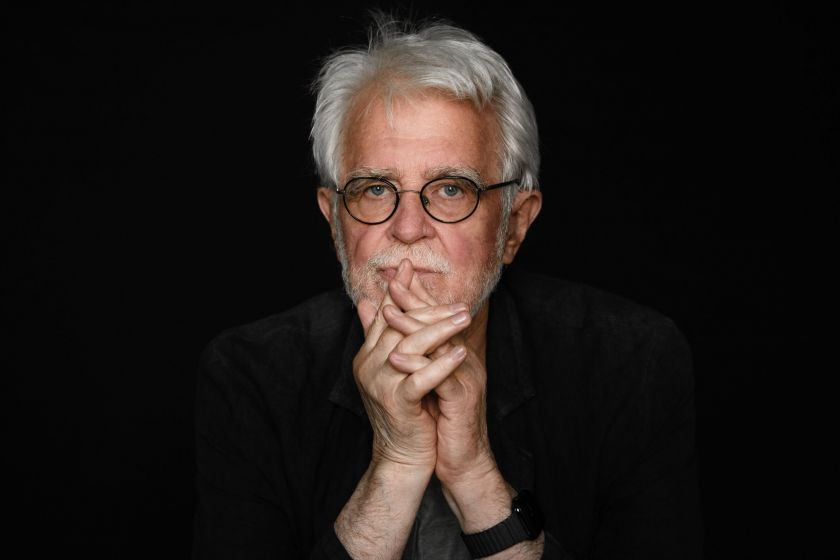About the Production: The Magic Mountain

Krystian Lupa is undoubtedly the most important and influential Polish theatre-maker of our time. At the Salzburg Festival, he directs for the first time this coming summer, dramatizing Thomas Mann’s Der Zauberberg (The Magic Mountain).. Some thoughts on Krystian Lupa and his theatre of collective dreams.
It can hardly be denied that Krystian Lupa has a very distinctive artistic signature which is easily identified. Stepping into his theatre, one delves into a dream-like universe, demonstratively isolated – “au-delà”. His productions are expansive, deliberate, hypnotic; in claustrophobic rooms that feel like air-raid shelters and are stuffed with furniture the colour of faded photographs, people deliver long dialogues and monologues, entering a space of collective dreams, an area of imaginary notions, memories and hallucinations.
Born in 1943, the director, set designer, graphic designer and writer has been fascinated by the notion of utopia since his artistic career began. For his 1970s debut, he founded a kind of post-hippie commune with a group of actor friends in Jelenia Góra in the Polish provinces. At the time, he staged mainly texts by the Polish avant-gardist Witkacy, which he interpreted in keeping with the writings of Carl Gustav Jung, his spiritual master at the time. From the beginning, Lupa’s theatre was first and foremost a kind of laboratory in which the actors delved into the depths of their subconscious, their dreams, wishes and fears, where one looked behind the most hidden layer of dreams in order to reach the very essence of existence.
The director is interested in outstanding, highly sensitive individuals, apparently mad people striving to transcend boundaries, whether by practicing art or entering religious, erotic or drug-induced ecstasy. No wonder Lupa is often called one of the last great Central-European modernists – an epithet he by no means rejects. His literary canon includes Robert Musil, Thomas Bernhard, Hermann Broch and Fyodor Dostoyevsky; among his favourite directors are Andrey Tarkovsky, Ingmar Bergman and Bernardo Bertolucci. Thus, he is inspired by works which grapple with the most complex philosophical, religious and existential problems. Works that aim to grasp the nature of European history and culture, animating people to reflect upon the mechanisms of memory and understand the specific nature of interhuman relationships.
Although Lupa concentrates on transformation processes of the individual, he is also intrigued by communities living through times of violent change, crises of existing values and the implementation of new rules, as well as turning points in art – including his own. Approximately every ten years, Lupa attempts to deconstruct and reinvent the existing model of his theatre-making. He has no wish to be a monument, and being labelled a master annoys him.
His first ground-breaking theatre production was Kalkwerk, based on Thomas Bernhard, in 1992: instead of an amorphous stage experiment, he presented a disciplined, intimate and devastating masterwork of dramatic art. In 2001, his adaption of Auslöschung (also based on Bernhard) shocked audiences, as he courageously posed the question, suppressed until that time, about the Polish contribution to the extermination of the Jews. With the premieres of the biographical fantasies Factory 2 (about Andy Warhol) and Persona. Marilyn, multimedia entered his theatrical method in 2008/2009, and a complex examination of popular culture took over the stage. In Capri – the Island of Fugitives, based on Curzio Malaparte, he offered the audience an open performance in 2019, in which he took to the microphone to offer a personal and candid commentary on current political reality in Poland.
Diese Fähigkeit, das Publikum in ein Gespräch über schwierige, dunkle und schmerzhafte Themen zu verwickeln, wusste man nicht nur in Polen zu würdigen; Lupa hat unter anderem in Frankreich, in den USA und Deutschland gearbeitet und in den letzten Jahren in Vilnius hochkarätige Produktionen (Bernhards Heldenplatz und Austerlitz nach W. G. Sebald) inszeniert – und damit die Litauer dazu gezwungen, sich mit den dunkelsten Seiten ihrer Geschichte auseinanderzusetzen.
This ability to involve the audience in a conversation about difficult, dark and painful subjects was valued not only in Poland; Lupa has worked in France, in the USA and Germany, and during recent years has staged high-carat productions in Vilnius (Bernhard’s Heldenplatz and Austerlitz, based on W. G. Sebald) – thereby forcing Lithuanians to confront the darkest aspects of their own history.
A stereotypical view treats reality and dreams as contrasts, as different dimensions. Lupa proves the opposite. His strange, dream-like performances provide a passage through which we arrive at the most pressing problems of our reality today.
Anna R. Burzyńska, translated into German by Liliana Niesielska and from German into English by Alexa Nieschlag
First published in the Festival insert of Salzburger Nachrichten 2024
